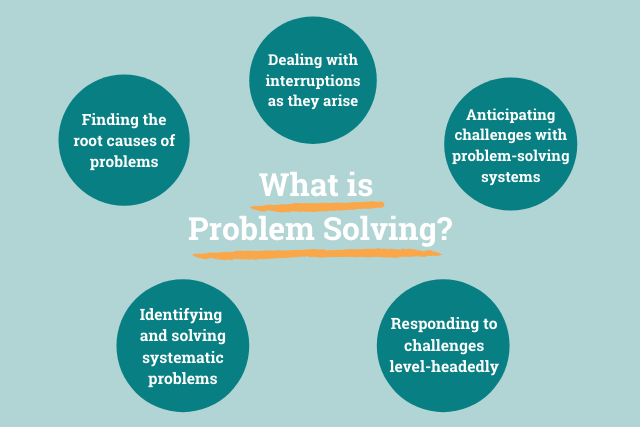
Whether you’re a CEO or a business owner, it’s important to possess the right business skills. The right skills can positively affect your company’s productivity, efficiency, and performance.
Good business skills make for efficient processes, and efficient processes reduce errors, waste, and duplication. They also streamline work and help you plan better and prepare for inevitable change. A company that continuously adapts to change grows quickly and easily keeps up with today’s unpredictable business world.
If a company has inefficient processes, costs may go up, customer complaints may increase, and employees may be unsatisfied with their jobs. They may miss deadlines because of unnecessary bottlenecks and end up wasting resources.
Improving business processes is an ongoing endeavor. You must identify and tackle weaknesses in practices and standards. Start by making small changes, then gradually build on those changes. That way, your company will always be growing. When disruptions come, you’ll deal with them quickly because you’re agile.
Changes in process begin with the people who create the systems your team works with every day.
So, what skills do you need to foster growth in your business? It comes down to more than technical skills. If you want to enhance your company’s business processes, learn these five skills.
1. Analytical Skills
Technology has become the mainstay of business, and when you continuously use the right technology, you increase your analytical thinking skills. Results from a McKinsey Global Survey show that more companies are now using data and analytics to grow. They’re thinking more critically and developing new business models. These firms are also adding new services and monetizing data by selling data-based products.
A while ago, the LinkedIn Learning Blog mentioned that analytical reasoning and business analysis are among the most-needed business skills.
These two skills are always in demand. Companies are collecting more data than ever and need professionals who understand what it means and make decisions based on it.
Analytical thinking helps you collect and evaluate data accurately to create better business processes. It requires objectively assessing your business, determining which areas need improvement, creating solutions, and implementing them.
Excellent analytical skills help you understand at which stage customers or employees are getting frustrated. For example, the checkout process on your site may be too complex, increasing shopping cart abandonment. You’ll also know which processes are costing the business money and time and come up with effective solutions.

Analytical Skills Case Study: Uber
Let’s take a look at Uber.
In early 2018, the technology company created a solution to improve its agents’ accuracy and speed in responding to support tickets. It was called COTA (Customer Obsession Ticket Assistant) and its aim was to streamline customer service and improve the user experience. COTA was designed to use natural language processing and machine learning, and minimized ticket resolution time by 10%.
Later, Uber released COTA v2, which led to more accurate ticket resolution and faster service. The average ticket handle time was reduced by almost 7%. This saved the company millions of dollars.
2. Communication Skills
A business thrives on communication. Effective communication makes for stronger decision making, faster problem solving, early identification of potential problems, steadier workflow, increased productivity, and strong business relationships.
Business is all about getting people to do things: customers to buy products, employees to work, or financiers to invest. It’s impossible to achieve all this with poor communication skills. Unclear, poorly written emails or documents lead to miscommunication, generating confusion and costing your company time and money. They may also damage its reputation.
Businesses communicate using many formats: video, email, images, phone calls, blog posts, signage, or advertising. Most of these are based on writing skills—even videos are captioned these days. The average person receives 121 emails a day, so if you want yours to stand out, you must write excellently.
Good writing is empathetic, easy to follow, and has a logical flow. It engages the reader, producing the action you desire. A prospect may buy your product or a visitor to your blog may sign up for your newsletter. To enhance your brand’s reputation, understand and adjust your writing style based on the audience.

Whether you’re writing a social media post, a memo, a proposal, or communicating with stakeholders, ProWritingAid can help you do so excellently. You will avoid grammatical mistakes, improve your document’s readability, and position yourself as an authority in your industry.
3. Project Management Skills
Without project management skills, you won’t provide good leadership, oversee resources well, track your progress towards goals, or balance priorities. Running projects without good project management is a recipe for disaster. It’s actually very costly and can significantly affect the overall budget.
Project management is one of the most critical skills for business success. You must be able to provide strategic direction on every project—from start to finish. When you possess project management skills, you inspire your team to do their best work, ensure clear lines of accountability, and bring leadership and direction to projects.
Good project management ensures project goals align with your company’s strategic goals and deliver real value. You set clear, realistic objectives and attain them on time. Without the leadership and direction that comes with project management, your company will underperform.
In business, there’s always pressure to complete projects on time, if not earlier. A report by the Society of Human Resource Management revealed that 38% of people are overwhelmed by the work they have to complete.
When you’re a good project manager, you don’t stress your team because you understand their workload. You monitor every step of the project and make the necessary adjustments to keep your employees motivated.
Running a business means dealing with tight deadlines, projects that take longer than expected, managing employees, and trying to achieve goals. It can be overwhelming for any person. It's best to prioritize tasks depending on your business needs. And with more people working remotely, project managers must be more flexible.
4. Problem-Solving Skills
Problem-solving is a skill every person should master, not just business executives. It allows you to exert control over your environment and gives you a mechanism for identifying problems, figuring out why things aren’t working, and creating a course of action to fix them.
Developing solutions is the foundation for new inventions, continuous improvement, and learning. When you know how to solve problems, you can easily step in and handle conflicts, navigate project roadblocks, and adjust processes accordingly.

There’s one thing many successful entrepreneurs know: you don’t need a game-changing, earth-shattering idea to start a business. You simply have to identify a problem and come up with a great solution.
For example, Tesla wasn’t the first company to invent the electric car, or the luxury electric car for that matter. But it did something other companies before it hadn’t done: it created a great business model for bringing electric cars to the market.
The company built a network of charging stations which solved the greatest hindrance to the adoption of electric vehicles (EVs): refueling on long trips. Its unique business model, which involves controlling both sales and services, has largely contributed to its soaring stock.
We would all love to achieve overnight success with a billion-dollar idea, but you can’t get far without problem-solving skills. Any successful entrepreneurs will tell you they got where they are by simply solving problems brilliantly.
When you have problem-solving skills, you:
- Quickly find the root causes of problems
- Deal with business interruptions as they arise
- Create different problem-solving systems for unique challenges
- See problems as opportunities
- Come up with solutions for long-term problems that improve the organization
- Maintain your cool during challenges
Not everything goes according to plan, especially in a business environment. When problems occur, that's when your problem-solving skills are tested. You must become adept at anticipating and identifying problems, and creating solutions for them.
5. Effective Delegation
59% of employees have been micromanaged at least once in their career. This negatively affected their work, decreased their morale, and lowered their productivity. Delegation goes beyond assigning tasks to the right people, it’s about assigning authority to other people to carry out specific activities. When you entrust work to other people, business processes run even when you’re absent.
Delegating effectively is a critical part of great leadership, but many leaders don’t delegate because they have insufficient time to train people. Others avoid delegating because they fear losing control. But if you fail to delegate tasks, you won’t have time to focus on tasks that specifically require your expertise. You may also get overloaded as your staff becomes under-utilized.
As the business owner, you’ll always be in charge, but you don’t have to do everything. Learn to delegate tasks to the experts in your team. You can also train team members who wish to learn new skills, enabling them to grow.

Also, don’t micromanage. Employees with autonomy over their work schedule often have increased job satisfaction. If done well, delegation fosters collaboration, enhances open communication, and builds trust.
A study by Gallup found that company CEOs who delegated more achieved a higher growth rate compared to those who delegated less. Delegating promotes a positive business culture where employees can grow. Delegate tasks such as website design or maintenance, accounting and bookkeeping, social media marketing, tech support, or customer service.
Grow Your Skills, Grow Your Business
As an entrepreneur, your life is all about plowing through obstacles and finding solutions where none are available. The right business skills can help you to improve your company’s business processes for good.
If you don’t possess any of the above skills, it’s time to change that. Find a mentor or take a business course. And don’t be too hard on yourself, learn each skill gradually and perfect it with time. Even improving writing skills takes time—that’s why you need ProWritingAid.

